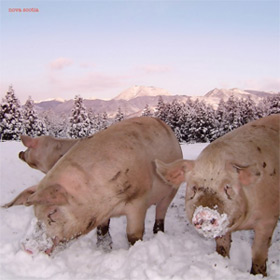Mess+Noise album review: Nova Scotia – ‘Nova Scotia’, March 2011
An album review for Mess+Noise. Excerpt below.
After two EPs and several years spent gigging at every Brisbane venue imaginable, this self-titled album is indie rock quintet Nova Scotia’s first full-length. Released via Lofly Records and mixed by label co-founder Andrew White (Mr. Maps, restream), Nova Scotia is just as demonstrative of the band’s songwriting abilities as their previous discs (2007’s Bear Smashes Photocopier and 2008’s Maritime Disasters), but the sonic differences here are instantly noticeable.
As great as those EPs were, the recording and production – or lack thereof – left a lot to be desired. Here, the instruments can each be heard clearly in the mix, but they haven’t lost that sense of five dudes jamming in a room, which has always been a big part of Nova Scotia’s charm.
Two re-recorded tracks from Photocopier (‘Second Sun’ and ‘Everything’s Perfect’) appear early in the piece, and while they sound better than ever, here’s where nostalgia ends. There isn’t a bad idea on Nova Scotia; if anything, the songs get better as the record progresses. Instrumental opener ‘Teeming With Voices’ is seemingly intended as the band’s theme song, and they frequently open their live sets with it too. Three different guitar tones sit atop clattering percussion. More than once, you get the feeling that it’s all about to cave in on itself. This sense of tension pervades most of the tracks here, and crucially, it’s an asset, not a distraction.
For the full review, visit Mess+Noise, where you can also stream the album’s final track, ‘The World Is Not Enough’. For more Nova Scotia, visit their Myspace.
